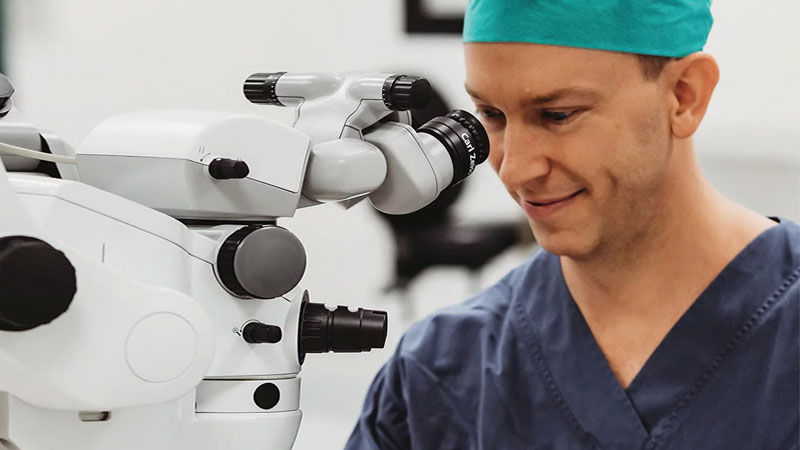Cataract surgery was the most common elective surgery performed in Australia in 2022-23, accounting for 10% of all intended procedures. It’s a procedure that OKKO Eye Specialist Centre’s highly-trained specialists perform on a regular basis, helping to restore sight to our Brisbane-based patients.
What are cataracts?
Cataracts develop when the natural lens in your eye begins to get cloudy, causing vision problems.
If you’ve developed cataracts, you may experience symptoms such as:
- Cloudy, blurred or dim vision
- Difficulty seeing at night – which can make nighttime driving difficult
- Sensitivity to light and glare
- Needing a brighter light for activities like reading or sewing
- Seeing halos around light
- Colours seeming faded or yellowy
- Double vision in the affected eye.
Unfortunately, there are no medications or lifestyle changes that can reverse or halt the progression of cataracts. Surgery is the only definitive treatment option available.
The good news is that cataract surgery is a common operation, with about 250,000 procedures performed each year – many by OKKO’s experienced specialist Ophthalmologists.
During cataract surgery, the cloudy lens is removed and replaced with an artificial intraocular lens (IOL). The procedure is typically performed in a day surgery under local anaesthesia. With advances in technology, OKKO Eye Specialist Centre can offer several surgical options to choose from, based on your lifestyle and vision needs.
What are the 3 types of cataract surgery?
Choosing the right type of cataract surgery depends on factors such as your vision goals, lifestyle, and budget. Let’s take a closer look at the three surgical options available:
1. Standard cataract surgery
Standard cataract surgery is the most commonly performed type of cataract surgery. During this procedure, your surgeon removes the cloudy lens and replaces it with a basic monofocal IOL. This lens is designed to provide clear vision at a single focal point, usually distance vision; that is, things over 1m away.
Is standard cataract surgery right for me?
It could be if you:
- Don’t mind wearing glasses for tasks like reading and computer work
2. Lifestyle cataract surgery
Lifestyle cataract surgery removes the cataract and an advanced premium IOL is then inserted to correct your distance and intermediate vision (approximately 60cm), meaning you can see at both distance and intermediate range without needing glasses.
Is standard cataract surgery right for me?
It could be if you want to:
- Reduce your dependence on glasses – you could swim, drive or watch a movie without wearing them, though you may still need them for close activities like reading
3. Refractive (laser) cataract surgery
Refractive cataract surgery removes your cataracts and aims to eliminate the need for glasses altogether by using special IOLs that correct near (approximately 40cm), intermediate and distance vision. We can then fine-tune your eye’s focus using LASIK surgery.
Is refractive cataract surgery right for me?
It could be if you:
- Seek full correction of all aspects of your vision
Compare the 3 different types of cataract surgery
What’s the best cataract surgery for me?
The most suitable type of cataract surgery for your needs depends on factors like:
- Your age
- Whether you wear glasses now
- Whether you want to keep wearing glasses after your surgery.
Take our cataract surgery quiz
to find out which surgery might suit you best.
How can we help?
OKKO Eye Specialist Centre offers all 3 types of cataract surgery. Each option is tailored to your needs, from basic vision correction to comprehensive solutions that can reduce dependency on glasses.
We’re known for our highly experienced ophthalmologists (many with subspecialty training in cataract surgery) and state-of-the-art facilities.
If you’re concerned about your eyes or know you need cataract surgery, please book a consultation. Our skilled ophthalmologists can check your eyes, recommend appropriate treatment and help you choose the right type of cataract surgery for your needs.
Disclaimer
All information is general and is not intended to be a substitute for professional medical advice.
References
- Australian Institute of Health and Welfare, Elective surgery, https://www.aihw.gov.au/reports-data/myhospitals/sectors/elective-surgery#, [Accessed 25 September 2024]







